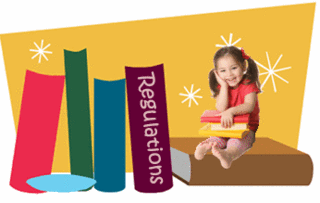Who Determines Childcare Regulations?

For childcare providers who are in the process of starting their own businesses, obtaining reliable information about licensure and regulations can be a challenge. Learning which agencies and entities regulate professional childcare settings is important, and also a complicated task. Caregivers and prospective business owners who plan to comply with all requisite regulations can achieve this goal by breaking regulations into federal, state and local mandates.
Federal Childcare Regulations
With the exception of the Head Start program, the federal government does not regulate any childcare programs. Instead, federal childcare regulations require each state to have basic health and safety laws in place in order to obtain Child Care and Development Block Grant funding. Because this program is responsible for subsidizing low-income families’ child care costs, states are required to certify basic health and safety regulations. This does not dictate the wording or specifics of regulation in each state, only that a state have such laws in place before receiving funding.
Under existing federal law, each state is required to regulate three areas of childcare: efforts to control and prevent infectious disease, physical premises safety, and training in health and safety appropriate to the program. Beyond these three very basic requirements, all regulations and legal requirements for childcare providers are set on the state level.
State Childcare Regulations
The vast majority of childcare regulations are put in place and enforced on the state level. Requirements can vary widely from one state to the next, so caregivers interested in opening their own childcare business should research the regulations specific to their state of operation.
Most states in the U.S. do not require all childcare providers to obtain licensure, and many don’t regulate all caregivers. Depending on the size and scope of a childcare program, regulation may not apply and licensing may not be required. Unregulated childcare providers are not required to comply with health and safety regulations by law, or to obtain background checks for employees. Exemptions from state regulation may be granted to religious-based programs, those affiliated with a school or those which operate only on a part-time basis. Any childcare provider who accepts federal block grant funding, regardless of size or affiliation, must meet all local and state requirements for health and safety in order to be eligible.
The state childcare licensing office in each individual state is responsible for enforcing its state’s regulations. Low funding for regulatory bodies may decrease the attention which state licensing offices can reasonably afford to provide each provider under its purview, which means some states may have less restrictive guidelines for the types of childcare providers which are required to obtain licensing. Child Care Aware® of America‘s 2013 report found the average state score across the nation was 61%, which translates to a D average through their grading system. Twenty states eared a score below 60%, which means they obtained a failing grade in terms of state licensing requirements and regulations.
Local Childcare Regulations
In many cases, local ordinances related to childcare providers and their businesses typically govern standard business guidelines, like zoning and municipal codes. Even a childcare provider who is not required by the state to obtain a license may be required to obtain a business license, depending on municipal business ordinances. It’s crucial for childcare providers and prospective business owners to make a point of learning the municipal requirements for operation, in addition to state laws which will govern their business.
Learning More
The best resource for childcare providers and owners of childcare business owners to find out more about the legal requirements is the state childcare licensing office. They will be able to explain the laws in your state, as well as helping you to determine whether or not your particular business will be exempt from licensing requirements.
If your business will not be required to obtain state-mandated licensure, looking into accreditation through a nationally recognized organization can provide you with a competitive edge and compelling selling point for parents. Unregulated childcare businesses can be off-putting to many parents, but acceptable accreditation can provide an additional level of legitimacy which reduces such apprehension.

I agree that requirements can vary widely from one state to the next, so caregivers interested in opening their own childcare business should research the regulations specific to their state of operation. Thanks for your sharing